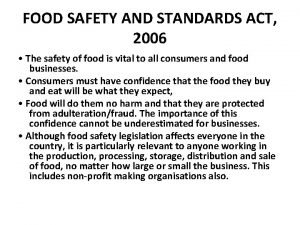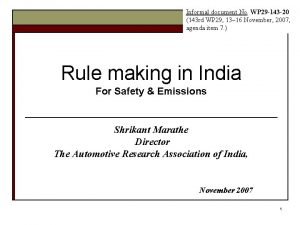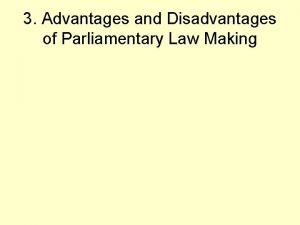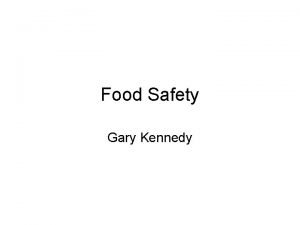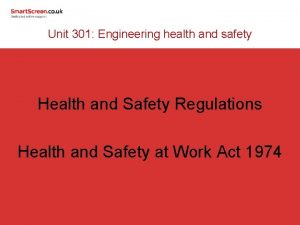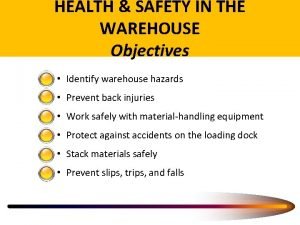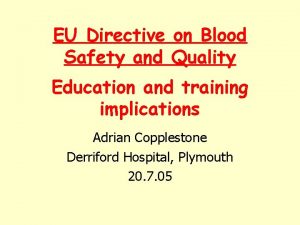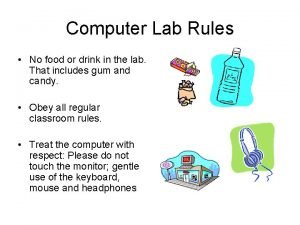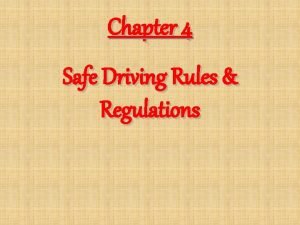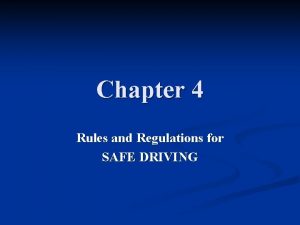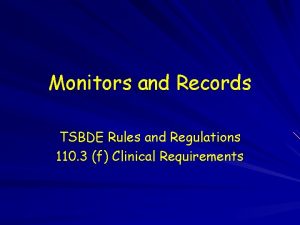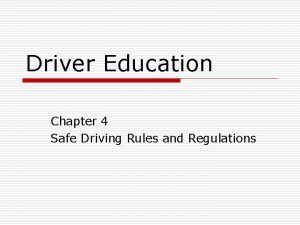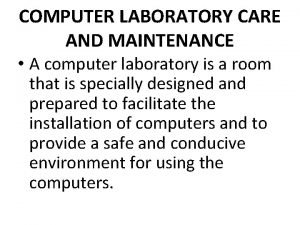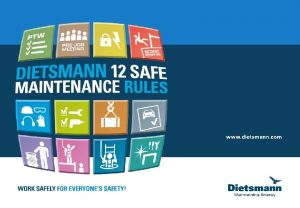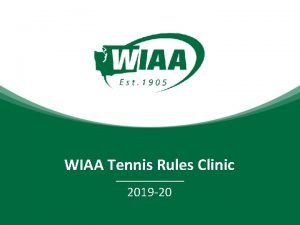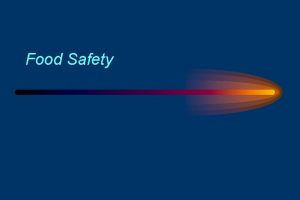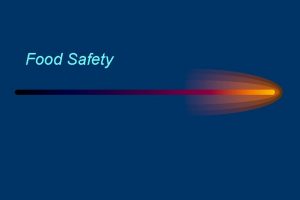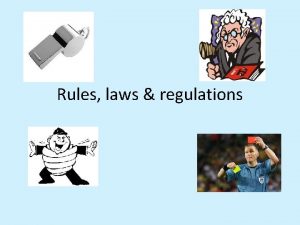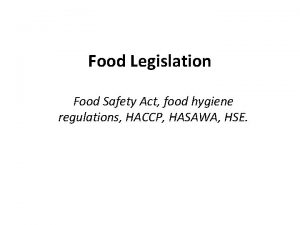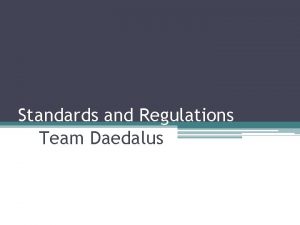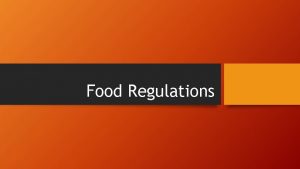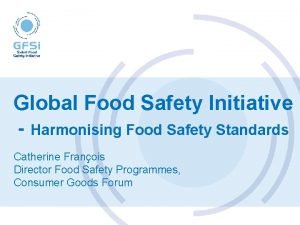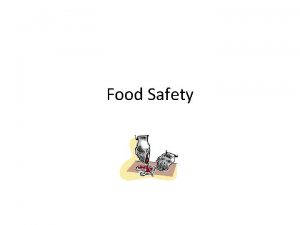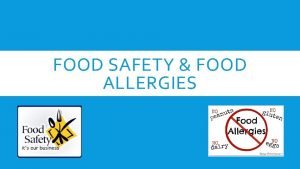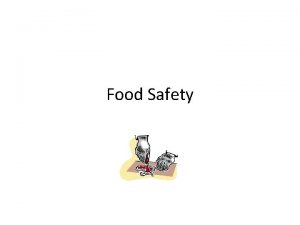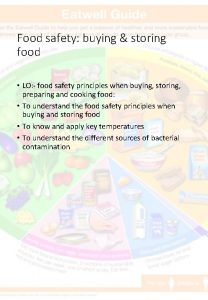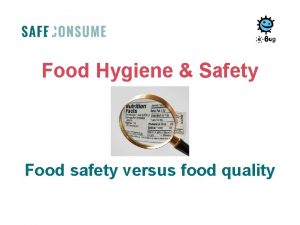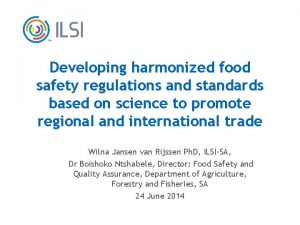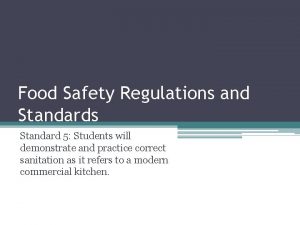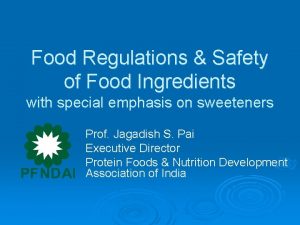Food Safety and Standards Acts Rules and Regulations



























- Slides: 27

Food Safety and Standards Acts, Rules and Regulations Laws (including Packaging and Labelling laws) Professor Dr Bellal Hossain Dept of NFE, DIU

� � � The Food Safety and Standards Act of 2013 enacted on which mandated setting up of a independent autonomous body Food Safety Authority of Bangladesh Food Safety Authority Rules - cover administrative structure and functioning of FSA and various bodies under it Food Safety and Standards Regulations - cover the various regulatory & compliance aspects of the food industry like licensing, labelling, use of additives, food standards etc.

�Licensing and Registration �Packaging & Labelling �Food Standards �Food Additives �Contaminants & Toxins �Prohibitions and Restrictions �Laboratory sampling and Analysis

SECOND SCHEDULE (Section 1985) – Following Acts /Orders get repealed through BSTI -BDS 1. The Prevention of Food Adulteration Act, 1964 2. The Fruit Products Standard 3. The Meat Food Products Order, 1985. 4. The Vegetable Oil Products (Control) Order, 2016. 5. The Edible Oils Packaging (Regulation) Order, 2016. 6. The Milk and Milk Products Order, 1985. 7. Any other order issued under the Essential Commodities Act, 1985 relating to food. � All provisions of these will get covered in the new regulations

� Food - “any substance whether processed, partially processed or unprocessed, which is intended for human consumption and includes primary food (except the produce in the hand of a farmer or a fisherman), genetically modified foods or foods having genetic ingredients, infant foods, packaged drinking water, alcoholic drink and also includes water used in food during manufacture or preparation. All types of imported foods also come under the purview of this Act. � The provisions of this Act shall not apply to any farmer or fisherman or farming operations or crops or livestock or aquaculture, and supplies used or produced in farming or products of crops produced by a farmer at farm level or a fisherman in his operations.

� A Food Business - any under taking, public or private for profit or not carrying out any of the activities related to any stage of manufacture, processing, packaging, storing, transportation, distribution, import of food including hotel and catering services, sale of food or food ingredients � Food Business Operator - a person by whom the business is carried on or owned and is responsible for ensuring the compliance of this law � New definition of Petty Food business and special provisions for them � Registration

Misbranded - article of food a. offered or promoted for sale with (i) false, misleading or deceptive claims either upon the label or through advertisement, or (ii) sold by a name which belongs to another article of food; or (iii)Sale or offered for sale under the name of a fictitious individual or company as the manufacturer or producer a. sold in packages which (i) is imitation of or is a substitute for or resembles in a manner likely to deceive (ii) bears false or misleading statement, design or device or is deceptive or (iii)the article is offered as the product of any place or country which is false or misleading b. if the article contained in the package – (i) contains any artificial flavouring, colouring or chemical preservative and the package is without a declaratory label or is not labeled in accordance with the requirements of this Act or regulations or (ii) is offered for sale for special dietary uses, unless its label bears such information as specified concerning its vitamins, minerals or other dietary properties in order sufficiently to inform its purchaser as to its value for such use; etc.

“Sub-standard” an article of food shall be deemed to be sub-standard if it does not meet the specified standards but not so as to render the article of food unsafe; “unsafe food” - article of food whose nature, substance or quality is so affected as to render it injurious to health : —Food can be rendered injurious for various reasons – definition given of Act-2013

� � “advertisement” means any audio or visual publicity, representation or pronouncement made by means of any light, sound, smoke, gas, print, electronic media, internet or website and includes through any notice, circular, label, wrapper, invoice or other documents; “food safety audit” means a systematic and functionally independent examination of food safety measures adopted by manufacturing units to determine whether such measures and related results meet with objectives of food safety and the claims made in that behalf; “Food Safety Management System” means the adoption of Good Manufacturing Practices, Good Hygienic Practices, Hazard Analysis and Critical Control Point and such other practices as may be specified by regulation, for the food business; “hazard” means a biological, chemical or physical agent in, or condition of, food with the potential to cause an

�“risk analysis” - a process consisting of three components, i. e. risk assessment, risk management and risk communication; �“risk assessment” - scientifically based process consisting of (i) hazard identification, (ii) hazard characterisation; (iii) exposure assessment, and (iv) risk characterisation; � “risk management” - the process, of evaluating policy alternatives, in consultation with stakeholders considering risk assessment and other factors relevant for the protection of health of consumers and for the promotion of fair trade practices, and selecting appropriate prevention and control options � “risk communication” - interactive exchange of information and opinions throughout the risk analysis process concerning risks, risk-related factors and risk perceptions, among risk assessors, risk managers, consumers, industry, the academic community and other interested parties, including the explanation of risk assessment findings and the basis of risk management decisions;

� � The Food Safety Authority- the apex body with 1 chairperson and 22 members in charge of complete administration of the Food Safety Act with the objective of regulating and monitoring the manufacture, processing, distribution, sale and import of food The authority to be advised by � Central Advisory Committee – mainly Enforcement matters � in administrative &

Food Safety Commissioner Centre & State Overall In charge for implementation District Designated Officer Food Safety Officer Adjudicating Officer Food Analyst

Food Safety Commissioner Responsible for overall implementation of the Act in the State through his team of Designated Officers and Food Safety officers a)ensure efficient and uniform implementation of the Rules & regulations b) ensure a high standard of objectivity, accountability, practicability, transparency and credibility; b)sanction prosecution for offences punishable with imprisonment under this Act; c)carry out survey of the industrial units engaged in the

Designated Officer – main executor of the law � Functions – � Grant or cancel license to FBO � Improvement notices � Hear appeals relating to licensing � Maintain record of all inspections � Investigate complaint against Operator or Food Safety Officer etc. � Issue Emergency prohibition order � Review working of the Food Safety Officers and Food Analyst alongwith consequent reporting to Food Safety Commissioner � Prosecution related – � Receive report and samples � Refer prosecution with only fine � Recommend imprisonment � to Adjudicating Officer to Commissioner launch of prosecution with Compound offences of petty manufacturers

Food Safety Officer – Responsibilities � Inspect any place where food is manufactured for sale or stored for sale or exhibited for sale � Inspection related � Take sample � Seize any article of food which is suspected to be in contravention of the Act � Review of the books of accounts or any other documents � Prosecution related � � � Evidence recording Send sample for analysis to Food Analyst Follow laid out process for sampling and seizure etc. Powers of a police officer in connection with entry and inspection of any premises Search, seizure, summon, investigation and prosecution powers under the Cr. PC , 1984 applicable to all action taken by the Officer under this Act 2013

Food Analyst – Duties � � � The Food Analyst shall analyse or cause to be analysed the article of food sent to him by FSO or purchaser for analysis. The report of analysis shall be signed by the Food Analyst After completion of analysis send his report to the Designated Officer, or the Purchaser of article of food, as the case may be

� � � � Unified Licensing procedures - Single Window Common application forms and procedures. Distinction between ‘registration’ and ‘licensing’. Cut off limits for registration and licensing. Two tier system of licensing – Central & State Introduction of exhaustive Safety, Sanitary and Hygienic conditions mandatory for registration/licensing. Intention to reduce inspections, more audit of system 60 days time limit for processing of license. Thrust on Preventive Actions

Registerin g Authority Food Safety Officer or any official in Panchayat, Municipal Corporation or any other local body in an area, notified as such by the State Food Safety Commissioner for the purpose of registration State Licensing Authority Central Licensing Authority Designated Officers appointed under Section 36(1) of the Act by the Food Safety Commissioner of a State or UT for the purpose of licensing and monitoring. appointed by the Chief Executive Officer of the Food Authority of India in his capacity of Food Safety Commissioner

FRAMEWORK FOR REGISTRATION/ LICENSING/MONITORING OF FOOD BUSINESS ESTABLISHMENTS CHIEF EXECUTIVE OFFICER, FSSAI GOVERNMENT COMMISSIONER OF FOOD SAFETY REGISTRATION AUTHORITY • City municipal corporation, • town Panchayat, • Gram panchayat CENTRAL LICENSING AUTHORITY DESIGNATED OFFICER LICENSING AUTHORITY FOOD SAFETY OFFICER (for Inspection and Monitoring Food Business operators) FSSAI Head Quarters (Licensing) ZONAL DIRECTORS & OTHER OFFICERS (for inspections & Monitoring)

Registration Procedure – for petty food manufacturer Filing of an Application Processing of Application Grant Registration Certificate if ok or reject or Issue notice for inspection Application Form A Fees Rs 100/- Within 7 days of receipt of application If no response Conduct inspection – suggest improvement if necessary After Inspection and satisfied with improvement grant registration or reject Within a period of 30 days Food Business operator may start business

Quality food manufacturer - Definition manufactures or sells any article of food himself or a petty retailer, hawker, itinerant vendor or temporary stall holder; or � such other food businesses including small scale or cottage or such other industries relating to food business or tiny food businesses with an annual turnover not exceeding Rs 12 lakhs and/or whose production capacity of food (other than milk and milk products and meat products) does not exceed 100 kg/ltr per day or production or procurement or collection of milk is up to 500 litres of milk per day or slaughtering capacity is 2 large animals or 10 small animals or 50 poultry birds per day or less �

Procedure of Licensing – other than petty manufacturers Filing of a completed Application alonwith NOC/Prod approval for proprietary products Acknowledge application & grant unique application no. Scrutiny, notice on any additional information required or incomplete Application if any 30 days FBO files additional required information Inspection of premises & issue inspection report, improvement notice Either grant or reject the license Within 60 days of receipt of completed application or within 30 days of inspection Application Form B Documents + Fees 15 days No inspection Improvement Notice FBO may start the busines s after 60 days No improvement Suspensio n No improvement Cancelation Fresh application After 90 days

Application Form A for registration � Application form B for Licensing � Documents to be submitted with application for license � License Format – Format C � Conditions of License – GMP, GHP – Schedule IV � Format for return Filing – Format D �

� Inspection – mandatory for All units applying for new license New Petty food business before granting registration only if registration Authority has reason to order an inspection � All Existing units - Once in a year � All existing units – before renewal of license - FBO having valid certificate of an accredited food safety auditor or from an agency accredited by Food Authority or any other organisation notified by food Authority - will not be normally required to be inspected before renewal of license. � � � Inspection can be done by the Registering or Licensing Authority or any officer or agency specifically authorized for this purpose � Copy of the inspection report to be handed to the applicant suggesting compliance for improvements if any. � After confirming that all requirements have been complied with licence to be issued � Inspection to be done as per Schedule IV of Licensing And registration regulation

Grant of License • License to be issued in Form C • License shall not be refused without giving the applicant an opportunity of being heard and for reasons to be recorded in writing. • A true copy of the license shall be displayed at a prominent place at all times within the premises of the FBO. • for canteens stores etc of Railways, Defense etc. Licensing Authority may authorise an officer from these organizations to function as a Designated officer. However, Food Authority may carry out food safety audit of these establishments once in a year through its own or accredited agencies.

� � � A Registration or license shall be valid for a period of 1 to 5 years as desired by the FBO, from the date of issue of registration or license Any Registration or license not applied for renewal within stipulated time shall expire and the FBO shall apply for fresh Registration or license if it wants to continue the business. FBO having valid certificate of a accredited food safety auditor or from agency accredited by Food Authority or any other organisation authorised by food Authority for this purpose will not be normally required to be inspected before renewal of license FBO Shall inform the Authority of any modifications or additions or changes in product category, layout, expansion, closure etc Every licensee shall on or before 31 st May of each year, submit a return in respect of each class of food products

At present , the regulations to set up any food industries of Bangladesh, are controlled by : Bangladesh Stander Testing Institute as per guidelines of BDS To control the regulations , the following organizations are in the field: BSTI BFSA Local government authority like City corporation Enforcement Team : RAB, CAB, PS, TNO, Licencing authority Local government , Ministry of Industry, Ministry of Food, Ministry of Health and Family welfare, Ministry of Finance and Commerce. For Export , Bangladesh Promotion Bauru , Trade commission , Board of Investment , BAPA etc are working. Without BSTI License , no products (Mandatory) should be commercially marketed.
 Food safety regulations and standards
Food safety regulations and standards Food safety and standards act,2006
Food safety and standards act,2006 Automotive regulations and standards
Automotive regulations and standards Advantages and disadvantages of rules and regulations
Advantages and disadvantages of rules and regulations Food laws in pakistan
Food laws in pakistan Food safety standards
Food safety standards Health and safety at work act engineering
Health and safety at work act engineering Six pack health and safety regulations
Six pack health and safety regulations Loading dock safety
Loading dock safety Six pack regulations
Six pack regulations Work health and safety act 2012 sa
Work health and safety act 2012 sa Blood safety and quality regulations
Blood safety and quality regulations Badminton vs table tennis
Badminton vs table tennis Class rules and regulations
Class rules and regulations Computer lab rules and regulations
Computer lab rules and regulations Child care facility rules and regulations
Child care facility rules and regulations Center line font
Center line font Chapter 4 safe driving rules and regulations
Chapter 4 safe driving rules and regulations Chapter 4 safe driving rules and regulations
Chapter 4 safe driving rules and regulations Head tilt chin lift and jaw thrust maneuver is used for
Head tilt chin lift and jaw thrust maneuver is used for Controlled uncontrolled and blind intersections
Controlled uncontrolled and blind intersections Preventive maintenance in computer laboratory
Preventive maintenance in computer laboratory Bwca rules and regulations
Bwca rules and regulations Maintenance rules and regulations
Maintenance rules and regulations Wiaa rules clinic
Wiaa rules clinic Rto rules and regulations
Rto rules and regulations Btec sport unit 2 rules and regulations
Btec sport unit 2 rules and regulations Canada motor vehicle safety act
Canada motor vehicle safety act

